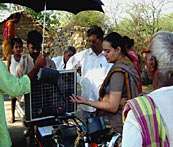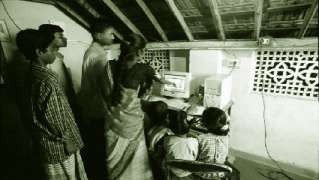India has been the land of the COW and more recently the land of the SARI too (after Aishwarya popularised the other timeless icon of India culture, on the Oprah Winfrey talk show. The COW and the SARI have taken on a new meaning in the light of rural IT initiatives in India.
COW : Computer on Wheels
COW, the Computer on Wheels project is a Stockholm Challenge initiative that was founded to further Internet access in remote villages in the state of Andhra Pradesh. The pr
 oject involves the use of motorcycles with Internet enabled laptops fixed on them. The people in and around the 21 villages surrounding Mahbubnagar district enjoy the benefits of this facility. Funded by the Seattle based non-profit organization, Digital Partners, this unique and innovative rural initiative aims to involve the millions of rural dwellers across India in the Internet revolution. The hey days saw people taking interest out of curiosity at this strange tech device riding pillion on a bike and visiting their villages twice a week. Slowly, this curiosity turned to admiration as farmers started realizing the power of the device. They now use it for querying crop prices, fertilizer information on the Internet with the aid of the technician accompanying the computer on wheels. Women Self Help Groups use the COW to find out new home based ventures that they can take up. Children are shown sites that provide them new ideas/activities to implement, using materials available in the rural setting.
oject involves the use of motorcycles with Internet enabled laptops fixed on them. The people in and around the 21 villages surrounding Mahbubnagar district enjoy the benefits of this facility. Funded by the Seattle based non-profit organization, Digital Partners, this unique and innovative rural initiative aims to involve the millions of rural dwellers across India in the Internet revolution. The hey days saw people taking interest out of curiosity at this strange tech device riding pillion on a bike and visiting their villages twice a week. Slowly, this curiosity turned to admiration as farmers started realizing the power of the device. They now use it for querying crop prices, fertilizer information on the Internet with the aid of the technician accompanying the computer on wheels. Women Self Help Groups use the COW to find out new home based ventures that they can take up. Children are shown sites that provide them new ideas/activities to implement, using materials available in the rural setting.The plan for the next three years involves setting up of 50 new COWs requiring operational costs of approximately 104,000$, covering about 750 villages. Setting up one COW comes to around 2000$. Surely, this COW project could turn out to be the divine cow Kamadhenu, the provider of all, for the rural dwellers in India.
SARI : Sustainable Access in Rural India
A program that aims to empower villages by not only providing them Internet and telephone connectivity, but also by networking hundreds of villages together.
 A joint collaborative effort between the IIT, Chennai, MIT Media Lab, Massachusetts and Centre for International Development, Harvard, the project in its pilot phase, has covered about 50 villages in the Madurai district of Tamil Nadu state in India
A joint collaborative effort between the IIT, Chennai, MIT Media Lab, Massachusetts and Centre for International Development, Harvard, the project in its pilot phase, has covered about 50 villages in the Madurai district of Tamil Nadu state in IndiaThe ultimate goal of the project is to create a local network effect by putting at least one connection in each village, offer access to schools and health clinics at low or no cost and unleash local champions and entrepreneurs.
The pilot project deploys in each community a multipurpose community telekiosk. Each telekiosk includes a desktop PC, monitor, battery-backup power supply, and wireless internet connection. Soon voice telephone connections will also be provided via franchise arrangements with basic service operations. Keeping the cost of the telekiosk low is central to the project's self-sustainability. The current technology suite is priced at approximately $1,000 per telekiosk. Many kiosks boast additional computers, printers, and a web camera.
The technology to achieve the network effect has been developed by IIT Chennai. Named corDECT, this low cost technology that forms the backbone of the SARI project provides cost-effective, simultaneous high-quality voice and data connectivity in both urban and rural areas. A corDECT access center is located roughly 25 kilometers from the kiosks. Optional relay base stations are located approximately 10 kilometers from kiosk village information centers or 15km from the Access Centre.
ICT backed initiatives like these are slowly but surely changing the perspective of the rural folk on the benefits that Information Technology can have on lives.
Read about other Rural Initiatives like Tarahaat, ITC e-Choupals.
Comments